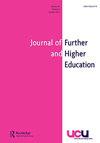‘Structured agency’, normalising power, and third space workers: higher education professional services staff as regulatory policy actors
IF 2.4
Q1 EDUCATION & EDUCATIONAL RESEARCH
引用次数: 0
Abstract
ABSTRACT As the English Higher Education (HE) system becomes characterised by centralised regulation, many professional services staff increasingly occupy significant positions sitting between traditional administrative roles, academia and management with responsibility for interpreting and implementing key policies. This study presents findings from a nested institutional case study, in a research-intensive institution, of the experiences of professional services staff implementing the Teaching Excellence Framework (TEF). Examining how policy ‘landed’ in two academic schools, the findings present staff acting as both operational and strategic drivers: experiencing the regulatory policy cycle as opportunities, subjugation and threat. On the one hand, the high-stakes nature of the TEF led to the development of policy-specific, third space-type roles with enhanced employment contracts, prestige, and agency and the reformulation of working relationships. On the other, the TEF, as but one feature of the regulatory burden on institutions, provided only a limited kind of agency – a term referred to here as ‘structured agency’ to staff. Through analysis of the diversity of roles, experiences and skills within the professional services workforce, this paper highlights the critical importance of professional services staff in a complex regulatory policy process, and the ways in which policy enactment in this space both constrains some individuals while, given adequate resource, enables others to carve out new career spaces and career trajectories. As the Office for Students (OfS) continues to normalise its power in institutions, these insights have important implications for labour force management, in turn allowing for the meaningful enactment of central policy within universities.“结构化代理”、权力正常化和第三空间工作者:作为监管政策参与者的高等教育专业服务人员
摘要随着英国高等教育(HE)系统以集中监管为特征,许多专业服务人员越来越多地占据着传统行政角色、学术界和管理层之间的重要职位,负责解释和实施关键政策。本研究介绍了在一个研究密集型机构中,对专业服务人员实施卓越教学框架(TEF)的经验进行嵌套机构案例研究的结果。通过研究政策是如何在两所学院“落地”的,研究结果表明,工作人员既是运营驱动因素,又是战略驱动因素:将监管政策周期视为机遇、征服和威胁。一方面,TEF的高风险性质导致了特定政策的第三空间型角色的发展,增强了雇佣合同、声望和代理,并重新制定了工作关系。另一方面,TEF只是机构监管负担的一个特征,它只为员工提供了一种有限的代理——这里称之为“结构化代理”。通过分析专业服务队伍中角色、经验和技能的多样性,本文强调了专业服务人员在复杂的监管政策过程中的至关重要性,以及在这一领域制定政策既限制了一些个人,又在获得足够资源的情况下,使其他人能够开拓新的职业空间和职业轨迹。随着学生办公室(OfS)继续使其在机构中的权力正常化,这些见解对劳动力管理具有重要意义,从而有助于在大学内制定有意义的中央政策。
本文章由计算机程序翻译,如有差异,请以英文原文为准。
求助全文
约1分钟内获得全文
求助全文
来源期刊

JOURNAL OF FURTHER AND HIGHER EDUCATION
EDUCATION & EDUCATIONAL RESEARCH-
CiteScore
5.20
自引率
4.30%
发文量
80
期刊介绍:
Journal of Further and Higher Education is an international, peer-reviewed journal publishing scholarly work that represents the whole field of post-16 education and training. The journal engages with a diverse range of topics within the field including management and administration, teacher education and training, curriculum, staff and institutional development, and teaching and learning strategies and processes. Through encouraging engagement with and around policy, contemporary pedagogic issues and professional concerns within different educational systems around the globe, Journal of Further and Higher Education is committed to promoting excellence by providing a forum for scholarly debate and evaluation. Articles that are accepted for publication probe and offer original insights in an accessible, succinct style, and debate and critique practice, research, theory. They offer informed perspectives on contextual and professional matters and critically examine the relationship between theory and practice across the spectrum of further and higher education.
 求助内容:
求助内容: 应助结果提醒方式:
应助结果提醒方式:


